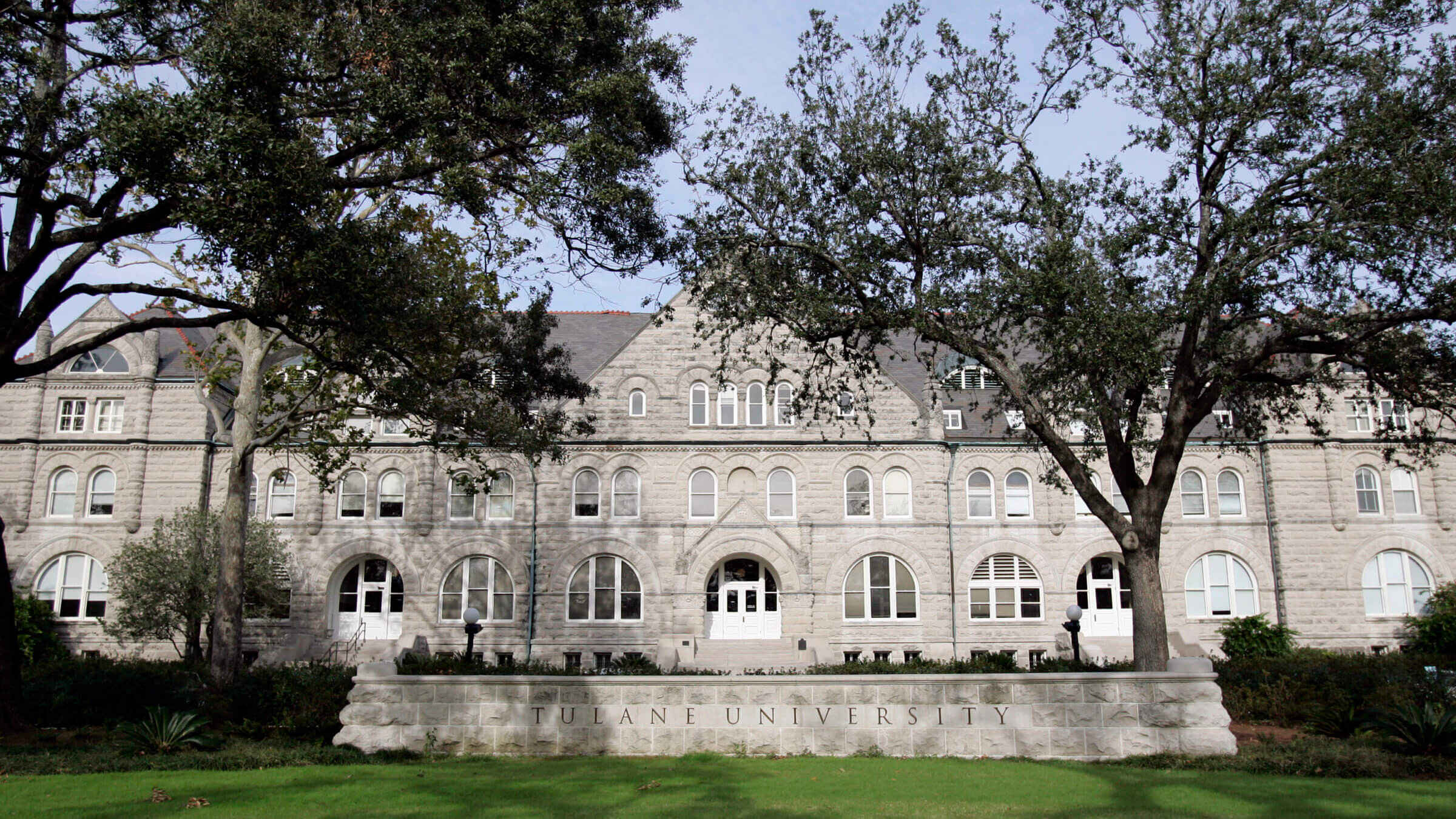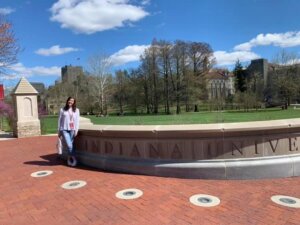Abortion becoming new factor in Jewish students’ college choices
In a post-Roe era, some are crossing schools off their wish lists

Nearly 41% of students are Jewish at Tulane University in New Orleans. Louisiana is among the most hostile states in the U.S. for reproductive freedom rights. Photo by Chris Graythen/Getty Images
Danny Tal is one of many Jewish high school seniors reconsidering their college application choices this fall in the wake of the Supreme Court’s overturning of the right to abortion. Tal, who attends Los Gatos High School in California’s Bay Area, is considering schools across the country, but has crossed the College of Charleston off her list, since South Carolina has banned abortion after six weeks and has a bill pending that could further restrict the procedure.
“I don’t want to go somewhere where I definitely can’t have all my rights when I need them,” Tal said in a recent interview. “It would be tough for me because I can’t imagine not having access to abortion if I were to get pregnant.”
There are, of course, myriad factors that go into college decisions — location, size, tuition, Greek life, sports, academic programs, alumni networks, the number of Jewish students and the quality of Jewish life on campus, to name a few. Now, some are also surveying the nation’s new patchwork landscape of abortion laws as they navigate both applications and life on campus.
“I have a friend who goes to the University of Wisconsin who’s studying nursing,” said Ashley Pertri, a first-year student at Indiana University. “A lot of her classes that she was planning on taking got canceled because they were talking about reproductive rights too much.”
In the months since the court’s June ruling, a dozen states — including Wisconsin — have banned abortion; another nine — including South Carolina — have bans caught up in court challenges; and four more now have gestational limits below the viability test that was in place for the last half century under Roe v. Wade.
Hillel professionals on several campuses in those states with high Jewish populations said they are focusing on training staff about resources for reproductive health support, and that they remain unsure how their help might be most needed.
A quarter of high school juniors and seniors who plan on attending a four-year college or university said they would not go to a school in a state that bans abortion, according to a July survey by Intelligent.com, a website that offers data to aid college decisions. The survey was not parsed by religious identity, but overall, Pew Research has found much higher support for abortion among American Jews than the general population, with 83% saying it should be legal in all or most cases.
A review of Hillel International’s list of the 120 public and private colleges with the largest Jewish populations shows that a third are in states where access to abortion has been severely restricted or may be soon. That includes Tulane University in Louisiana, where Hillel says 41% of the undergraduates are Jewish; Washington University in St. Louis (26% Jewish, according to Hillel); University of Florida (19%) and University of Miami (17%); University of Michigan (16%); Vanderbilt University (14%), University of Wisconsin, Madison (13%); Indiana University (12%); and several schools in Ohio.
A future that looks bleak
Rabbi Sue Laikin Silberberg, executive director of Indiana University’s Hillel, said that she has not had a single student approach her for help seeking an abortion in more than 30 years on campus. But since the high court’s ruling in Dobbs v. Mississippi, she said, there’s a rising fear on campus that safe and effective birth control may soon be restricted in the state.
It is unclear what Jewish professionals can do, now, if a student asks for help obtaining an abortion barred by state law. As a member of the clergy, Rabbi Silberberg said that she has a “recognized form of privileged communication that protects the contents of conversations between religious advisers and an advisee.” But others might be classified as “mandatory reporters,” required to report any potential violation of state law to the authorities.
Jordan Robinson, a graduate student at Wayne State University in Michigan and co-president of its Hillel student cabinet, said he has heard of Hillel staff volunteering to drive students across state lines to the nearest abortion clinic. “They’re willing to risk a lot to do that,” Robinson said.
Haley Schreier, director of engagement at the University of Michigan’s Hillel, said many students are focused on the November election, where an initiative on the ballot would enshrine the right to abortion in the state’s constitution. That would overturn a century-old law banning abortion that was suspended during the Roe era, and now is being challenged in court.
At Oberlin College in Ohio, where a ban on abortion after six weeks is pending in court, Zoe Levine, manager of Jewish student experiences, said the school’s move last year to make a Catholic health organization its campus provider was already preventing it from providing Plan B abortion bills or access to surgical abortions.
Levine said that she has started to hear students talk about transferring from Oberlin, whose population is 23% Jewish, to schools in states where access to abortion is not under threat.

Naomi Yankellow, a senior at Indiana University, said she had chosen the school in part because when she first visited the campus in Bloomington, she saw a lot of Black Lives Matter signs and LGBTQ flags. If she were applying to college now, with Roe overturned, Yankellow said, she would have thought to herself, ‘Oh, red state, I’m not going there.”
She and her boyfriend have agreed that after graduation in the spring, they will only move to a state where abortion is legal.
“I feel very lucky that I am a senior and that I am graduating and I’m getting out of here very soon after my rights are taken away,” Yankellow said.
And it’s not just women who are focused on how Dobbs might affect college students.
Josh Schreiber, a sophomore at Miami University of Ohio, started advocating for abortion rights a year ago, when the Ohio legislature was discussing a bill that would have banned all abortions, working with the Cincinnati chapter of Planned Parenthood to develop talking points for lobbying lawmakers.
“I’m fortunate not to have to worry about the repercussions the same way women do,” Schreiber said. “But having a twin sister and a lot of friends that are girls scares me. Knowing they come to school to get a degree … and the school will make them have a kid instead. That’s something that’s scared me not just for the safety of who’s in my life, but for our society’s general safety.”
Compounding the risk to Ohio students is that the state is surrounded by others — Indiana, Kentucky — where abortion is banned. Schreiber said he sees a “future that looks bleak and is in danger.”
The Forward is free to read, but it isn’t free to produce

I hope you appreciated this article. Before you go, I’d like to ask you to please support the Forward.
Now more than ever, American Jews need independent news they can trust, with reporting driven by truth, not ideology. We serve you, not any ideological agenda.
At a time when other newsrooms are closing or cutting back, the Forward has removed its paywall and invested additional resources to report on the ground from Israel and around the U.S. on the impact of the war, rising antisemitism and polarized discourse.
This is a great time to support independent Jewish journalism you rely on. Make a gift today!
— Rachel Fishman Feddersen, Publisher and CEO
Support our mission to tell the Jewish story fully and fairly.
Most Popular
- 1

Fast Forward Ye debuts ‘Heil Hitler’ music video that includes a sample of a Hitler speech
- 2

Opinion It looks like Israel totally underestimated Trump
- 3

Culture Cardinals are Catholic, not Jewish — so why do they all wear yarmulkes?
- 4

Fast Forward Student suspended for ‘F— the Jews’ video defends himself on antisemitic podcast
In Case You Missed It
-

Culture How one Jewish woman fought the Nazis — and helped found a new Italian republic
-

Opinion It looks like Israel totally underestimated Trump
-

Fast Forward Betar ‘almost exclusively triggered’ former student’s detention, judge says
-

Fast Forward ‘Honey, he’s had enough of you’: Trump’s Middle East moves increasingly appear to sideline Israel
-
Shop the Forward Store
100% of profits support our journalism
Republish This Story
Please read before republishing
We’re happy to make this story available to republish for free, unless it originated with JTA, Haaretz or another publication (as indicated on the article) and as long as you follow our guidelines.
You must comply with the following:
- Credit the Forward
- Retain our pixel
- Preserve our canonical link in Google search
- Add a noindex tag in Google search
See our full guidelines for more information, and this guide for detail about canonical URLs.
To republish, copy the HTML by clicking on the yellow button to the right; it includes our tracking pixel, all paragraph styles and hyperlinks, the author byline and credit to the Forward. It does not include images; to avoid copyright violations, you must add them manually, following our guidelines. Please email us at [email protected], subject line “republish,” with any questions or to let us know what stories you’re picking up.
















